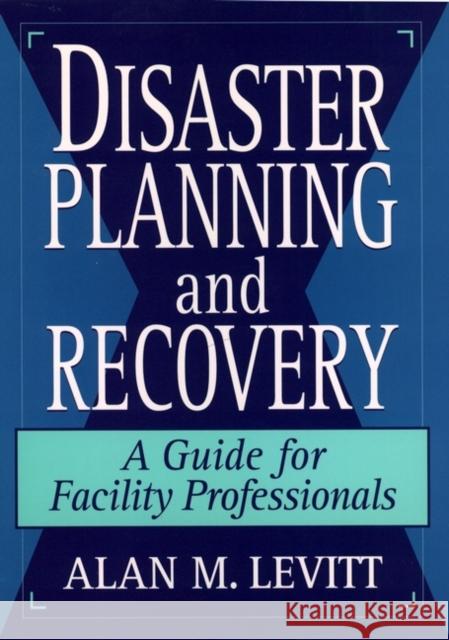Disaster Planning and Recovery: A Guide for Facility Professionals » książka
Disaster Planning and Recovery: A Guide for Facility Professionals
ISBN-13: 9780471142058 / Angielski / Twarda / 1997 / 432 str.
"The focus of this guide is to assist you in planning for all the vital factors and imperative considerations essential in enhancing the likelihood of your organization's continuity and survival when impacted by an out-of-course event: planning to prevent disasters, planning to reduce the likelihood of disasters, planning to deal with disasters, and planning to recover after a disaster has affected the organization." -- Alan M. Levitt
The only complete, hands-on guide to disaster planning, Disaster Planning and Recovery provides proven strategies, tools, and techniques for helping your company plan for, cope with, and recover from cataclysmic events. Internationally recognized business continuity expert Alan M. Levitt tells you what you need to know to avoid having natural and man-made disasters become business disasters. You'll find out how to:
* Create an effective plan in advance
* Reduce the likelihood of disasters
* Maintain functioning when disaster strikes
* Mobilize staff safely and efficiently during an emergency
* Reduce costs of and recovery time following an out-of-course event
* Work effectively with key departments, including IT, HR, maintenance
* Minimize stress on staff members
* And much more
Earthquakes, floods, fires, tornadoes . . . there isn't much you can do to stop them from happening, but there are steps you can take to prevent natural and man-made disasters from turning into business disasters. And that is what this book is all about: minimizing the damage done to your business by cataclysmic external events.
The only complete, practical guide of its kind, Disaster Planning and Recovery shows facility professionals how to prepare for, cope with, and rebound from a disaster. Alan Levitt clearly demonstrates that the first major step toward minimizing risk and optimizing recovery time following an emergency is to formulate a comprehensive disaster plan. Drawing upon his years of experience as a business continuity expert--and using fascinating and instructive vignettes and case studies (many of them previously unpublished) to illustrate his points--he shows you how to develop the most cost-effective plan possible.
Rather than offer a set of one-size-fits-all checklists and procedures, Levitt supplies a rational framework and proven strategies for formulating a plan tailored to your business. He shows you how to set reasonable goals that will allow you to react more quickly and effectively without losing sight of business outcomes. And he provides the means for researching and conducting the five phases of a comprehensive disaster/recovery plan: identifying potential disasters; quantifying the risk of occurrence; establishing parameters for reducing that risk; forecasting the potential impact a disaster can have on personnel, plant, and business processes; and establishing systems for counterbalancing those impacts.
Throughout Disaster Planning and Recovery, the emphasis is on human factors. Levitt describes techniques for efficiently mobilizing staff in an emergency, working effectively with key departments, such as IT, and most importantly, easing the stress that disasters can impose on staff members. Disaster Planning and Recovery is an indispensable resource for facility professionals, human resources managers, building owners and managers, architects, designers, and planners.











